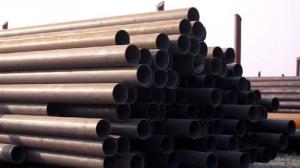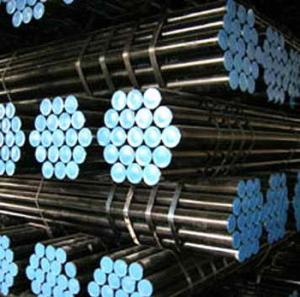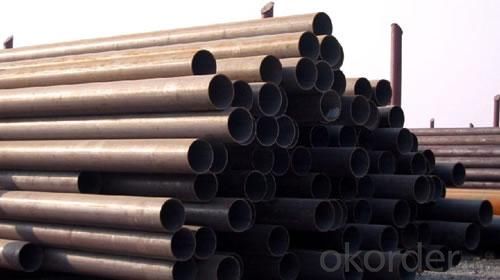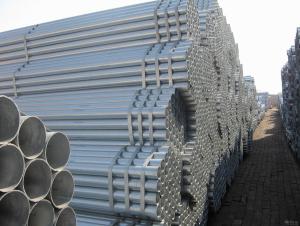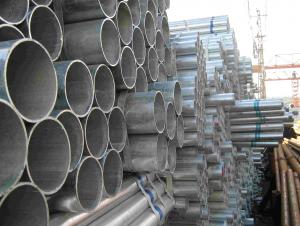JIS G3462(Alloy Steel For Boiler And Heat Exchanger)
- Loading Port:
- China Main Port
- Payment Terms:
- TT or LC
- Min Order Qty:
- 20mt m.t.
- Supply Capability:
- 5000 Tons Per Month m.t./month
OKorder Service Pledge
OKorder Financial Service
You Might Also Like
Specifications of JIS G3462 Alloy Steel For Boiler And Heat Exchanger
1. Type:JIS G3462 Alloy Steel for Boiler and Heat Exchanger Tubes (STBA12/ 13/ 20/ 22)
2. OD:12-680mm
3. WT: 2-60mm
Application of JIS G3462 Alloy Steel For Boiler And Heat Exchanger
Packaging:
Inner Packing:Caps at both ends, steel strong trips on every bundle
Outer Packing:Standard export package or as per clients' requirements Catalouge of our products
Standard and Usage of JIS G3462 Alloy Steel For Boiler And Heat Exchanger
1. GB5310 Seamless Steel Pipe For High Pressure Boiler
2. GB6479High Pressure Seamless Pipe For Chemical Fertilizer Equipment
3. GB9948Seamless steel tube for petroleum cracking Tube
4. ASTM A213 Seamless Ferritic and Austenitic Alloy-Steel Boiler, Superheater, and Heat-Exchanger Tubes
5. ASTM A335 Seamless Ferritic Alloy-Steel Pipe for High-Temperature Service
6. ASTM A179 Seamless Cold-Drawn Low-Carbon Steel Heat-Exchanger and Condenser Tubes / Pipes
7. ASTM A192 Seamless Carbon Boiler steel pipe for High-Pressure
8. ASTM A210 Seamless Medium-Carbon Boiler pipe and Superheater Tubes
9. JIS G3458 Alloy Steel Pipes (STPA 12/ 20/ 22/ 23/ 24/ 25/ 26)
10. JIS G3462 Alloy Steel for Boiler and Heat Exchanger Tubes (STBA12/ 13/ 20/ 22)
11. JIS G3467 Steel Tubes for Fired Heater (STF 410/STFA 12/ 22/ 23/ 24/ 25/ 26)
12. DIN17175-79 Electrical Resistance Or Induction Welded Steel Tubes for Elevated Temperature
Grade of JIS G3462 Alloy Steel For Boiler And Heat Exchanger
1. Cr5Mo (STFA25 STPA25 STBA25 T5 P5)
2. 15CrMo (STFA22 STPA22 STBA22 T12 P12)
3. 1.25Cr0.5Mo (STFA23 STPA23 STBA23 T11 P11)
4. Cr9Mo (STFA26 STPA26 STBA26 T9 P9)
5. 12Cr1MoV
6. 12Cr2Mo (10CrMo910 T22 P22)
7. 10Cr9Mo1VNb T91 (P91)
8. 12Cr2MoWVTiB (R102)
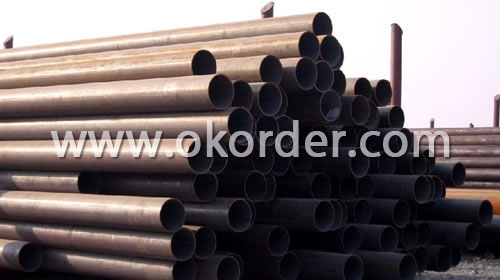
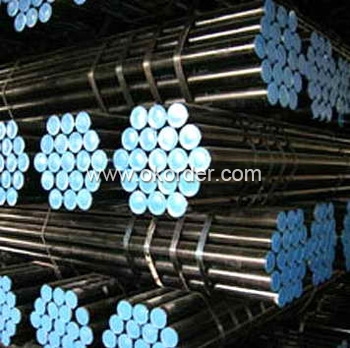
- Q: What are the common methods of joining steel pipes?
- The common methods of joining steel pipes include welding, threading, and using mechanical couplings. Welding involves fusing the pipes together using heat, while threading involves screwing the pipes together using threads on the ends. Mechanical couplings are devices that connect the pipes together using compression or other means.
- Q: What are the common applications of galvanized steel pipes?
- Galvanized steel pipes are commonly used in various industries and applications such as plumbing, water supply systems, gas pipelines, electrical conduits, construction projects, fencing, and outdoor structures. The galvanization process adds a protective zinc coating to the steel, making it resistant to corrosion and extending its lifespan, making it ideal for applications requiring durability and longevity.
- Q: How are steel pipes used in the oil and gas industry?
- Steel pipes are extensively used in the oil and gas industry due to their durability and strength. They are used for various purposes like drilling, transportation, and processing of oil and gas. Steel pipes are employed in drilling wells, providing a conduit for the extraction of oil and gas from the ground. Additionally, they are used for gathering and transporting hydrocarbons from the wellhead to processing facilities or storage tanks. Steel pipes also play a crucial role in the construction of refineries and petrochemical plants, where they are used for the transportation of various fluids and gases involved in the refining process.
- Q: How are steel pipes insulated to prevent heat gain?
- Steel pipes are insulated to prevent heat gain by applying a layer of thermal insulation material around them. This insulation material acts as a barrier, preventing the transfer of heat from the surrounding environment to the steel pipes. Additionally, the insulation is often covered with a protective outer layer to enhance its durability and resistance to external factors.
- Q: What are the different coating options for steel pipes?
- Steel pipes have numerous coating options to choose from, each serving a specific purpose and offering unique advantages. Some common coating options for steel pipes include: 1. Fusion Bonded Epoxy (FBE) Coating: FBE coating is widely used across industries due to its exceptional corrosion resistance, impact resistance, and adhesion to the pipe surface. This coating is typically applied through a heat-induced chemical reaction, resulting in a durable and protective layer. 2. Polyethylene (PE) Coating: PE coating is commonly employed for underground steel pipes as it provides superior resistance against corrosion, abrasion, and chemicals. It is applied using extrusion techniques, forming a seamless layer that prevents moisture penetration. 3. Polyurethane (PU) Coating: PU coating is renowned for its outstanding resistance to abrasion, chemicals, and harsh environmental conditions. It is frequently used for steel pipes exposed to extreme temperatures or aggressive environments. Multiple layers of PU coating can be applied to enhance protection. 4. Coal Tar Enamel (CTE) Coating: CTE coating is a traditional choice for steel pipes requiring protection against corrosion. It is a thick, black coating that effectively resists water, soil, and atmospheric corrosion. This coating is typically applied using a hot-applied method. 5. Zinc Coating: Zinc coating, also known as galvanization, is a widely used protective coating for steel pipes. It involves applying a layer of zinc to create a barrier against corrosion. Zinc coating can be applied through hot-dip galvanization or electro-galvanization techniques. 6. Concrete Coating: Concrete coating is often utilized for steel pipes in underground or submerged applications. It provides a robust protective layer against corrosion, abrasion, and mechanical damage. Concrete coating is typically applied as a cement mortar or reinforced concrete layer. These options represent just a few of the available coatings for steel pipes. The selection of a coating depends on factors such as the intended application, environmental conditions, and desired durability. Choosing the appropriate coating is crucial to ensure the longevity and performance of steel pipes in various industries.
- Q: What are the different sizes available for steel pipes?
- Steel pipes are available in a wide range of sizes, including standard sizes such as ½ inch, 1 inch, 2 inches, and up to larger sizes like 24 inches and beyond. The specific sizes available depend on the manufacturer and the intended application of the steel pipes.
- Q: What do you mean by "SC" in welded pipe SC200? What's the diameter of 200?
- Including galvanized steel pipe, but galvanized steel pipe is generally used for plumbing professional, electrical professional generally only civil air defense or high anti-corrosion requirements of the region;
- Q: What are the different types of steel pipe coatings for chemical processing plants?
- There are several types of steel pipe coatings commonly used in chemical processing plants, including epoxy coatings, polyethylene coatings, and fusion-bonded epoxy coatings. These coatings provide protection against corrosion and chemical damage, ensuring the longevity and safety of the pipes in such environments.
- Q: How are steel pipes used in the construction of water treatment plants?
- Steel pipes are commonly used in the construction of water treatment plants for various purposes such as transporting water, carrying chemicals, and handling wastewater. They are often used as the main conduits for distributing treated water throughout the plant, as well as for supplying raw water from the source to the treatment facility. Steel pipes also play a crucial role in the transportation of chemicals used in the treatment processes, ensuring their safe and efficient delivery. Additionally, steel pipes are utilized for the disposal of wastewater and sludge, allowing for proper drainage and disposal systems within the plant. Overall, steel pipes are essential components in the construction and operation of water treatment plants, providing the necessary infrastructure for the efficient and effective treatment of water.
- Q: How are steel pipes used in the construction of underground parking garages?
- Steel pipes are used in the construction of underground parking garages for various purposes, including providing structural support, serving as conduits for utilities such as water and electricity, and facilitating drainage systems. They are often used as deep foundation elements to support the weight of the structure and the vehicles above. Additionally, steel pipes are commonly used for installing fire suppression systems, ventilation systems, and plumbing connections within the parking garage.
1. Manufacturer Overview
| Location | Jiangsu, China |
| Year Established | 2005 |
| Annual Output Value | Above US$100 Million |
| Main Markets | Main land; Middle East; Southeast Asia |
| Company Certifications | ISO 9001:2008 |
2. Manufacturer Certificates
| a) Certification Name | |
| Range | |
| Reference | |
| Validity Period |
3. Manufacturer Capability
| a) Trade Capacity | |
| Nearest Port | Shanghai |
| Export Percentage | 61% - 70% |
| No.of Employees in Trade Department | 390People |
| Language Spoken: | English; Chinese |
| b) Factory Information | |
| Factory Size: | Above 600,000 square meters |
| No. of Production Lines | Above 10 |
| Contract Manufacturing | OEM not offered |
| Product Price Range | Average |
Send your message to us
JIS G3462(Alloy Steel For Boiler And Heat Exchanger)
- Loading Port:
- China Main Port
- Payment Terms:
- TT or LC
- Min Order Qty:
- 20mt m.t.
- Supply Capability:
- 5000 Tons Per Month m.t./month
OKorder Service Pledge
OKorder Financial Service
Similar products
Hot products
Hot Searches
Related keywords
